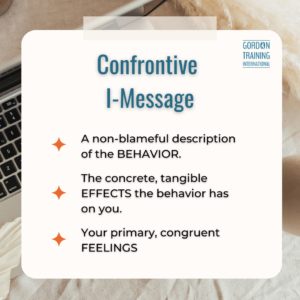When you have a problem with a team member, boss or anyone that you have a relationship with (at work or at home), you have a much better chance of influencing them to change their behavior if you tell them your thoughts and feelings in a clear, direct, non-blameful way.
Just like with the other I-Messages in the Gordon Model, it’s important to own your thoughts, needs and feelings. And to learn to express them to your coworkers, leader and others to deal with the times that their behavior interferes with your meeting your needs.
We call this kind of I-Message a Confrontive I-Message. It lets the other person know what’s going on with you and that you need their help. It does not blame or put down the other person or tell them what to do.
A Confrontive I-Message has three parts:
• The behavior that is a problem for you
• The real effect that this behavior has on you
• Your feeling
Notice that there is no solution within a Confrontive I-Message.
Your solution (the one that’s usually found in a blameful You-Message) may meet only your needs, not the Other’s. If so, it will create unnecessary resistance; in fact, proposing any solution tends to offer an immediate point of resistance which is better to do without. Avoid preconceived solutions!
Without being faced with a solution, the Other is free to come up with a solution that not only meets your needs, as expressed in your I-Message, but meets his/her own, as well, which will motivate him/her to carry it out.
Without being presented with a solution, the Other has a chance to be considerate of your needs and feelings by choosing his or her own way to help you out.
This is both an esteem-building and a growth-producing action for the Other to take.

